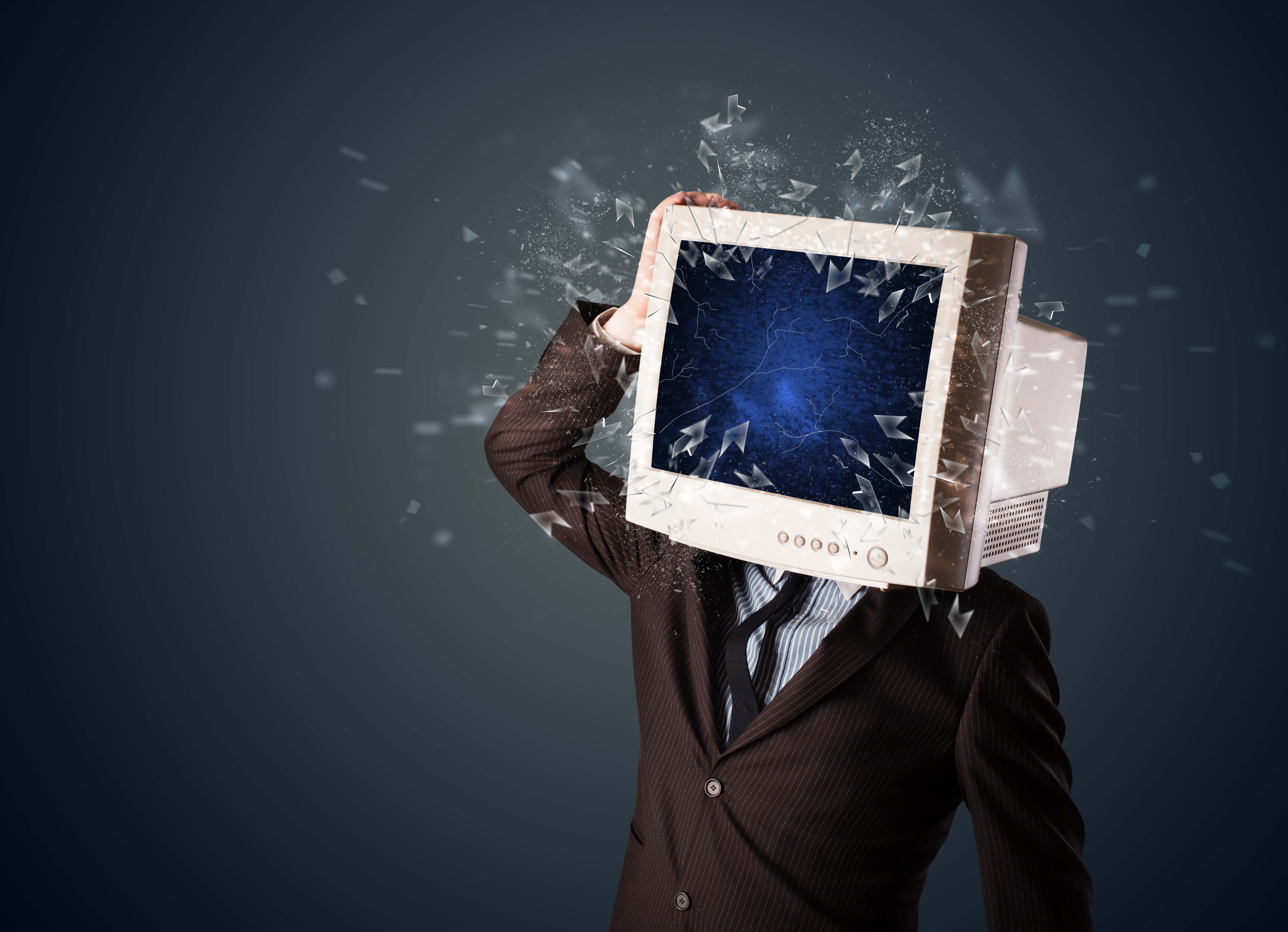Nowadays humans suffer from diseases that didn't exist in the past, a trend that will probably continue into the future. A wide range of new disorders, especially related to the latest technologies, may affect us.
The disease of the future are related to our modern lifestyle, they affect the psyche but, in the long run, can also debilitate the organism. Computers, video games, office work, virtual realities, and their lumbering presence, are just some of the elements that have changed the context in which we live and the way we spend our time. Technology has found our new weaknesses and will exploit them.
Even if it's impossible to know which pathogens will afflict us in the future, we can explore the health issues that could emerge as a consequence of technological advancements and our inability to cope with them. Virtual Reality Addiction, Nature Deficit Disorder, Computerization of the Personality, Nanotech Poisoning, shown below a selection of third millennium diseases.
1. Computerization of the Personality
 People who spend many hours in front of a computer, for work or for fun, may experience a computerization of the personality.
People who spend many hours in front of a computer, for work or for fun, may experience a computerization of the personality.
The relationship with the computer influences cognitive processes and daily actions of the person affected from this modern disease. People with computerized personalities relate with others in the same way they communicate with the machine. The language, the way of thinking, the decision-making processes reflect information technology methods.
Anxious and impatient, they don’t speak much. Long talks bore them, they think people have lost the ability to answer in a concise and clear way. Unambiguous, impersonal, fast, that’s the kind of conversation they want.
Yes/No, Proceed/Cancel, Save/Delete, Open/Close are their only possible answers to everyday life situations.
2. Virtual Reality Addiction
 Simulations are increasingly more influential, satisfying and meaningful than the reality they are presumed to represent. Virtual reality is introducing us to environments and settings far more compelling than real life. Digital worlds are more and more "real" and blended with our physical world.
Simulations are increasingly more influential, satisfying and meaningful than the reality they are presumed to represent. Virtual reality is introducing us to environments and settings far more compelling than real life. Digital worlds are more and more "real" and blended with our physical world.
VR offers the opportunity to physically interface with friends and colleagues across vast distances, and with a dizzying array of technological features at disposal, it won't be easy to detach. Once fully immersive VR gets available, it will be difficult for people to engage with reality. Consequently, virtual reality addiction will become a common and serious problem. In the Society of Simulations in which we are living, will we still be able to have genuine experiences?
3. Metalosis Maligna
Metalosis Maligna is a documentary by Floris Kaayk about a disease which affects patients with medical implants. Sourcing from such implants a wild metal growth ultimately transforms human patients into mechanical looking constructions.
The film shows a downside of technological progress and our desire to manipulate nature in an attempt to improve our bodies. A group of researchers from the University of Groningen actually took the term Metalosis Maligna and used it to name a new class of pseudo-tumors caused by the friction of the metal in patient with a metal knee or hip.
4. Nature Deficit Disorder
 A warning message on videogames packaging advises players to take a break for every hour of activity. Despite that, young people– and some adults - spend hours with their face glued to screen. We are consumed with screens of all types and sizes. Whether it’s high-definition TVs, laptops, or mobile devices, we interact with screens more than we do with other individuals. We are spending less time outdoors resulting in new behavioral problems.
A warning message on videogames packaging advises players to take a break for every hour of activity. Despite that, young people– and some adults - spend hours with their face glued to screen. We are consumed with screens of all types and sizes. Whether it’s high-definition TVs, laptops, or mobile devices, we interact with screens more than we do with other individuals. We are spending less time outdoors resulting in new behavioral problems.
Nature Deficit Disorder refers to a hypothesis by Richard Louv in his book Last Child in the Woods. Louv says the effects of the lack of nature in today's wired generation lives will be an even bigger problem in the future: “An increasing pace in the last three decades, approximately, of a rapid disengagement between children and direct experiences in nature has profound implications, not only for the health of future generations but for the health of the Earth itself”.
5. Nanotech Poisoning
 Scientists use to operate on a nanoscale, ranging from nanostructures, nanocircuits, nanocoatings, nanosensors, and more. In the future, medicines will get smarter thanks to nanotechnology, but at the same time, nanotechnological devices infused into the human body could cause serious problems.
Scientists use to operate on a nanoscale, ranging from nanostructures, nanocircuits, nanocoatings, nanosensors, and more. In the future, medicines will get smarter thanks to nanotechnology, but at the same time, nanotechnological devices infused into the human body could cause serious problems.
Since there is no authority to regulate nanotech-based products at the moment, there are many products that could possibly be dangerous to humans. Poorly designed nanobots could deliver medicines to the wrong area, or act in unpredictable ways. And if their programming goes wrong, they could physically damage tissue, or replicate uncontrollably, leading to an internal catastrophe.
6. Superintelligence Psychosis
 To be in step with the times, we'll start to increase our intelligence and boost our cognitive abilities using biotechnologies and cybernetics. Genetic modification could tweak us to be smarter, while neural interfaces might allow us to plug our brains directly into the web. But the acquisition of extreme cognitive abilities could prove to be counter-productive.
To be in step with the times, we'll start to increase our intelligence and boost our cognitive abilities using biotechnologies and cybernetics. Genetic modification could tweak us to be smarter, while neural interfaces might allow us to plug our brains directly into the web. But the acquisition of extreme cognitive abilities could prove to be counter-productive.
Our evolutionarily-calibrated psychologies may not be able to handle such exceptional intelligence. Super smart augmented brains will think too much, causing information overload, anxiety attacks, existential cries, egomania and many other psychosis.
7. Life-Extension Ennui
 Once we conquer aging, some of us might get bored living an indefinitely long life, suffering a general tiring of life itself, an emotional condition known as ennui. As humans are not psychologically primed for living an indefinitely long life, our psychologies won't handle such long expanses of time and experiences.
Once we conquer aging, some of us might get bored living an indefinitely long life, suffering a general tiring of life itself, an emotional condition known as ennui. As humans are not psychologically primed for living an indefinitely long life, our psychologies won't handle such long expanses of time and experiences.
Super-elderly people living in such a state would find everything flat and hyper-repetitive, nothing would seem exciting or new anymore. Living an exceedingly long life, without the threat of death, will impose meaninglessness to our lives.
Featured image and Computerization of the Personality image via: Shutterstock
Related posts: Transportations Of The Future, Professions Of The Future

Share your thoughts and join the technology debate!
Be the first to comment